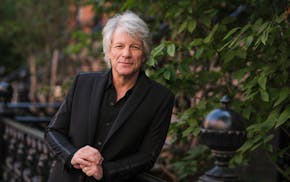At major theaters across the Twin Cities, one delicate subject is suddenly at center stage: Race.
No fewer than 16 shows this fall are addressing racially themed topics such as police brutality and segregation. So many performances are focused on race, in fact, that some theaters have had trouble finding actors of color to fill all the roles.
"If you look at Twin Cities theater history, there is nothing on this order of magnitude," said Mixed Blood Theatre founder Jack Reuler, who just presented "Barbecue," a satire about Hollywood stereotyping.
The array of productions exploring difficult racial issues is in part a reaction to the national conversation ignited by the Black Lives Matter movement, local directors say.
New leadership at theaters is also a factor, with Guthrie artistic director Joseph Haj — a Palestinian-American — leading the way by encouraging fresh voices at the Upper Midwest's flagship playhouse.
To Haj and others, the emphasis on race is not merely a matter of doing the right thing. To survive, they argue, theaters have to reflect the region's changing demographics and attract more diverse audiences. Moreover, shows like the Broadway smash "Hamilton" have proved that issues-driven drama can be the stuff of hip, compelling theater.
"One of the most important questions about our thriving in the future is: 'Does our organization reflect the community in which we reside?' " Haj said.
Actors of color are in the enviable position of having full dance cards for once.
"People have been talking about equity and inclusion for decades, and it's gratifying that they're beginning to put that talk into practice," said Ansa Akyea, a black actor who had two shows overlapping this fall.
At night, he played an incarcerated musician in "Bars and Measures," which just closed at the Jungle Theater, while starring during the day in "Pericles" for Ten Thousand Things.
Local theatergoers hungry for topical drama have a rich list from which to choose.
Curious about the 1960s Freedom Riders who faced angry Southern police while standing up for civil rights? You can see "The Parchman Hour" at the Guthrie.
Interested in how race plays into immigration issues? Theater Latte Da is staging "Ragtime," a musical about the uneasy mix of ethnic groups in New York a century ago. And "Hold These Truths," a solo show at the Guthrie, recalls the internment of Japanese-Americans during World War II.
Local dancers are getting into the act, too, with American Indian choreographer Rosy Simas staging "Skin(s)" at Intermedia Arts this weekend, while TU Dance will present two world premieres about racial bias and social justice at its fall show next month.
People of color account for nearly all of the net population growth in Minnesota since 1990, according to census statistics. At the same time, Minnesota theaters are at a historic juncture of reinvention, with new leaders taking the helm at the Guthrie, the Jungle Theater, Mu Performing Arts and Penumbra Theatre.
Meanwhile, established troupes such as Mixed Blood, Pillsbury House, Ten Thousand Things and Children's Theatre Company (CTC) are showing renewed vigor.
A national leader in its field, CTC commissioned recent works by such diverse playwrights as Cheryl West and Naomi Iizuka, whose "The Last Firefly," inspired by Japanese folk tales, is now playing.
"When people talk about the future, they mean something out there, far away," said CTC artistic director Peter Brosius. "But it's here for us. You see it in our audience in terms of who's in our public schools — who's under 12. We're embracing that change right now."
Foundations, both local and national, are supporting the effort. The Mellon Foundation has given the Guthrie $1 million for an initiative called Level Nine, aimed at drawing a more diverse community to the theater's ninth-floor studio by offering experimental works and discounted tickets.
The challenge for theaters is to retain their core audiences while bringing in new patrons. Companies report that, in large part, traditional ticket buyers are embracing this broadened vision, staying for post-show discussions and writing affirmative letters.
Avid theater patron Pauline Boss, a Guthrie regular for 35 years, was moved by "The Parchman Hour," which connects the Freedom Rides to the police killings of black men in contemporary America.
"Frankly, it's about time we had a show like this that both entertains us and raises our consciousness," Boss said.
Taking deep dives into diverse stories is hardly a new thing for some local troupes.
Pulitzer-winning playwright August Wilson found his voice at Penumbra, the St. Paul company that has championed African-American works for 40 years. It just opened its anniversary season with a Wilson classic, "Jitney," about a black neighborhood threatened by urban renewal. The show is selling so well, the company extended its run an extra week.
Mu Performing Arts, another culturally specific company, has become a national leader in building an Asian-American canon.
Mixed Blood and Pillsbury House have made stories involving race and urban issues their bread and butter. But playhouses such as the Jungle and Park Square are relative newcomers to the arena.
"I'm glad it's not only happening in February — Black History Month," said Greta Oglesby, who plays the matriarch in Park Square's "A Raisin in the Sun," opening next week. "These are juicy, delicious roles and we, as actors, are glad to bite into them."
The Jungle's recent premiere of "Bars and Measures," about two musical brothers separated by prison bars, was its first show to focus principally on black characters.
"As we move into this new space — as we extend an invitation to broader audiences — we do so with humility and with a love for our traditional audience, which has been incredibly receptive," said Sarah Rasmussen, who became the theater's artistic director a year ago.
Some fear that playhouses such as Penumbra, Mu and Mixed Blood, which set the table for the new openness about race, may be left behind as other companies expand their reach. If Penumbra's new co-artistic director, Sarah Bellamy, is concerned, she does not show it.
"We have an expertise developed over years," she said. "We hope that those who are doing more diverse and relevant work are doing it with care and responsibility. There's been so many misrepresentations and stereotypes, and the stakes are too high."
CTC's Brosius echoed that sentiment while expressing his faith in the power of theater to transform lives.
"We have a lot of work to do as a society — we're living in very fractious times," Brosius said. "But theater has an extraordinary ability to take absent narratives and bring them into the light. And we're all stronger for it as we learn from each other."
612-673-4390 • Twitter: @rohanpreston
Olympian Kristi Yamaguchi is 'tickled pink' to inspire a Barbie doll

After 4 decades in music and major vocal surgery, Jon Bon Jovi is optimistic and still rocking
Rom-com author Emily Henry knows the secret to having a healthy relationship with love

